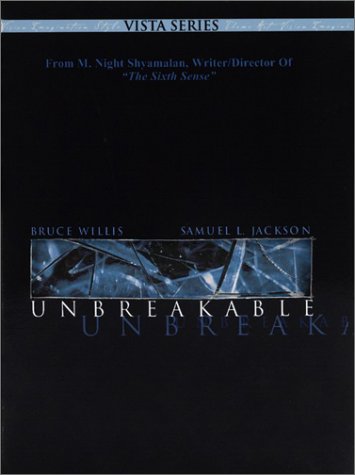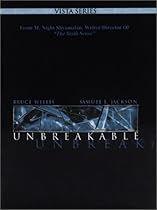 This disappointing follow-up to THE SIXTH SENSE reteams star (Bruce Willis) and writer-director (M. Night Shyamalan), but the old magic fails to re-materialize, thanks to overwrought melodrama and contrived plot developments. The premise (of a man who miraculously survives a train wreck that kills everyone else on board) initially seems intriguing, setting up a mystery that the audience is eager to explore; unfortunately, the script begins to fall apart as it reveals the explanation for what is happening. Ultimately turns laughable in its attempt to take a frankly silly comic book premise and treat it with all the seriousitude of an ersatz Greek tragedy. Imagine mixing gummy bears with Terrine de Foie Gras Naturel, and you’ll have some idea of the result.
This disappointing follow-up to THE SIXTH SENSE reteams star (Bruce Willis) and writer-director (M. Night Shyamalan), but the old magic fails to re-materialize, thanks to overwrought melodrama and contrived plot developments. The premise (of a man who miraculously survives a train wreck that kills everyone else on board) initially seems intriguing, setting up a mystery that the audience is eager to explore; unfortunately, the script begins to fall apart as it reveals the explanation for what is happening. Ultimately turns laughable in its attempt to take a frankly silly comic book premise and treat it with all the seriousitude of an ersatz Greek tragedy. Imagine mixing gummy bears with Terrine de Foie Gras Naturel, and you’ll have some idea of the result.
Unbeknownst to himself, David Dunne (Bruce Willis) appears to be, as the title suggests, “unbreakable.” The audience wants to know why, but the film is slow to answer, because the script has other fish to fry, regarding David’s unhappy home life. Eventually, the domestic drama slows down long enough for Elijah Price (Samuel L. Jackson), a dealer in rare comic book art, to suggest that David is the real-life equivalent of a superhero. Elijah suffers weak bones that easily fracture (earning him the nickname “Mr. Glass”), and he believes David may literally be his polar opposite.
This interesting idea diverts the story in onto a new track: instead of coming to terms with guilt over surviving an accident that killed so many others, David slowly accepts the reality of his own incredible capabilities. Unfortunately, this process occupies most of the remaining screen time. As in he did in SIXTH SENSE, Shyamalan wants to establish the ordinary, everyday reality before pushing the fantasy element into it. It’s a clever gambit, but it works to less effect here. SIXTH SENSE, in spite of its ghost story trappings, touched on emotions and experiences that are closer to our own real lives than anything in UNBREAKABLE. Even if you don’t believe in ghosts, you’ve lost a loved one or had a sense of something invisible in the dark. UNBREAKABLE simply cannot tap into the same well, no matter how hard it tries. Although there are some entertaining moments, the revelations and melodrama undermining believability instead of enhancing it.
The screenplay struggles to prevent the “superhero” element from completely eclipsing the domestic drama. David apparently resents his wife (Robin Wright Penn) because he gave up a promising football career for her (a physical therapist, she didn’t want to marry a man whose job consisted of inflicting injuries). But David’s revelation about his preternatural abilities leads him to realize he has a different destiny, erasing any regrets.
As sincere as this effort is, it stumbles over the comic book motif, which suggests a level of fantasy that simply does not blend with the other elements. The worst example of this is the incredible scene (which should have ended up on the cutting room floor) when David’s son (Spencer Treat Clarke) aims a gun at his father over the dinner table and threatens to shoot him to prove that he is in fact invulnerable. Instead of putting viewers on the edge of theirs seats, this scene (filmed in a single take) simply starts them wagging their heads.
The search for meaning is a powerful theme in art and entertainment. UNBREAKABLE strives to embrace this theme, as David searches for an answer to explain his inexplicable survival, an answer that ultimately has ramifications that affect and improve his life. But the quest for meaning can be dangerous. Facts do not always conform to our philosophies, and high-minded ideals can be out of touch with reality. Pure idealism can be the most dangerous thinking, because it seeks to conform the world at large to a conception that may not be possible. It is for this reason that we move on from the fairy tales of our youth (with their clear dichotomy between Good and Evil) and explore other, more complex forms of storytelling as we grow older. For young mind, fairy tales provide a way of understanding the world (as Bruno Bettleheim pointed out in The Uses of Enchantment), and they continue to form a rich soil for interpretation and enjoyment even when you’re older—but you would be ill advised to take them literally.
Shyamalan seems to be setting up a story that will play off this idea. Elijah states that comic books present a cheapened, commercialized version of the heroic myth, suggesting that the film will present a more sophisticated version. Instead, we get the usual comic book clichés, just dressed up in every day clothing, and the result borders on absurdity. When Elijah offers up his endless interpretations of David’s situation, you laugh. You laugh even more when the cornball action is contrived to match Elijah’s theories. Elijah opines that water is the equivalent of kryptonite for David. When David inevitably falls into a pool while fighting a criminal, you would hope that Shyamalan would use the moment to undermine the superhero myth—to show the difference between expectation and reality, to keep the story at a believable level, to remind us that David is, after all, a human being, not an alien from another world. Instead, the scene plays out exactly like the most formulaic comic book movie, complete with a last-minute rescue and a swelling, uplifting surge from the orchestral score to tell us that he may look like a mere man, but he really is a superman.
Comic books are an interesting and entertaining medium, but you would be ill advised to attempt living your life according to them. That’s why it is easy to relate when David initially rejects that idea that he is the real-life embodiment of a comic book superhero. Eventually, the film does undermine Elijah’s assertions, but only with a last-minute twist ending that is dramatically empty and pointless. Yes, Shyamalan finally admits, squeezing your life to fit the pattern of a comic book can have bad effects on the psyche, but the message rings hollow because it is simply presented to us as a bald fact, not as something that emerges dramatically out of David’s story. Consequently, the ending falls flat, provoking groans of disappointment from the audience.
Which is really too bad, because the evidence of enormous talent is so abundantly on display here. Willis and Jackson are great. Technical aspects are excellent. Shyamalan offers up interesting characters and ideas and uses some carefully honed craftsmanship to get them on screen, include long, unbroken takes that let the cast handle the dramatic work, as opposed to flashier camera angles and editing used to convey David’s “superpower.”
Clearly, a lighter – perhaps even tongue-in-cheek – touch would have been more appropriate for such an over-the-top fantasy tale. The serious aspirations simply undercut what could have been an amiable action-packed fantasy. The result is a frustrating, broken fragment of what could have been.
DVD & BLU-RAY DETAILS
 In 2001, Disney launched their line of live-action special edition DVDs, with the UNBREAKABLE Two-Disc Vista Series. This featured an anamorphic widescreen transfer and Dolby Digital 5.1 and DTS 5.1 sound, but the bonus features were limited to a handful of items on Disc Two (which probably could have fit on Disc One). There was a “Behind the Scenes” documentary; a “Comic Book and Superheroes” featurette; a multi angle feature for the “Train Station Sequence”; seven deleted scenes; and “Millionaire,” a short amateur movie Shyamalan made as a boy.
In 2001, Disney launched their line of live-action special edition DVDs, with the UNBREAKABLE Two-Disc Vista Series. This featured an anamorphic widescreen transfer and Dolby Digital 5.1 and DTS 5.1 sound, but the bonus features were limited to a handful of items on Disc Two (which probably could have fit on Disc One). There was a “Behind the Scenes” documentary; a “Comic Book and Superheroes” featurette; a multi angle feature for the “Train Station Sequence”; seven deleted scenes; and “Millionaire,” a short amateur movie Shyamalan made as a boy.
The 2008 Blu-ray disc (released on April 1) offers increased video resolution, plus an uncompressed Linear PCM 5.1 soundmix and the old Dolby Digital 5.1 soundmix, but not the DTS 5.1 mix. Otherwise, it contains all the familiar DVD bonus features, ported over to the new format, without any additions.
UNBREAKABLE (2000). Written and directed by M. Night Shyamalan. Cast: Bruce Willis, Samuel L. Jackson, Robin Wright Penn, Spencer Treat Clark, Charlayne Woodard, Eamonn Walker.
RELATED REVIEW: The Sixth Sense